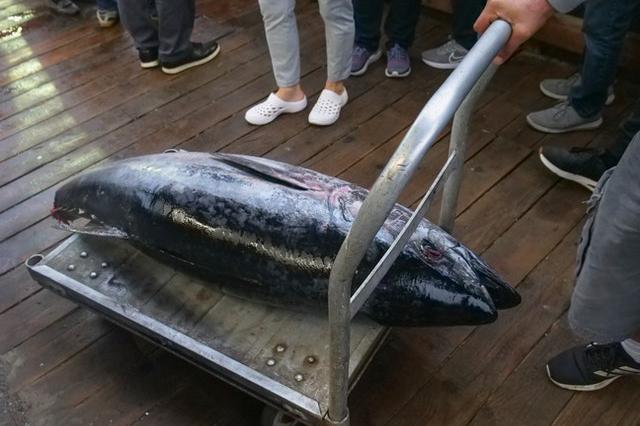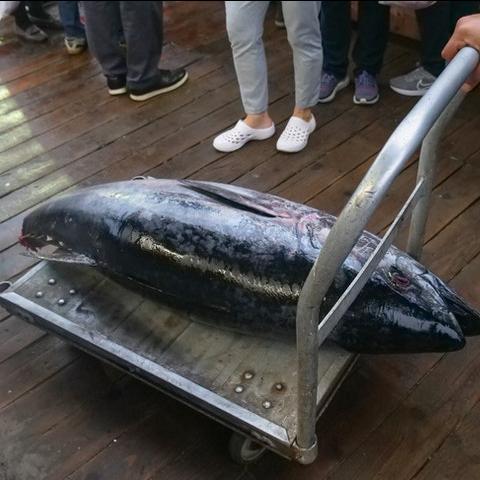Fast Food Garbage Makes up 50% of Street (and Pacific Gyre) Litter


The Great Pacific Garbage Patch, aka the Pacific Gyre is roughly the size of Texas and contains about 3.5 million tons of trash, floating between Hawaii and San Francisco. About 80 percent of marine plastic pollution comes from the land. Clean Water Action (CWA) decided to learn more about the sources of trash that end up in the San Francisco Bay Area so the non-profit organization decided to collect samples of street litter from four Bay Area cities (Oakland, Richmond, San Jose, and South San Francisco) from October 2010 through April 2011. CWA collected trash from a few locations in each city.
CWA found that the biggest source (49 percent) of litter is fast food. The five most significant sources were McDonalds, Burger King, Seven Eleven, Starbucks and Wendy's. Up to 31 percent, according to CWA's findings, of the trash collected could be eliminated by reusable alternatives.
"The quantities of trash and plastic pollution in waterways are increasing dramatically. California regulators have been responding to this problem but the result is that the local government is having to spend millions of dollars in controlling trash. This is a short-term solution that doesn't get at the root cause of the problem," said Miriam Gordon, California director of CWA.
Gordon told Fast Company about one simple solution to help reduce trash: napkin dispensers. Gordon said, "We've spoken to restaurant owners who felt that they were spending too much money on napkins. Napkin dispensers make it hard to grab more napkins than you need, so [they] save money, and there are fewer napkins that can become litter."
"Even just asking customers if they need napkins, straws, and utensils before loading up their take-out bags could make a difference," the Fast Company article stated. "Many of the straws found on the street by Clean Water Action were still in their wrappers."
Starbucks sets an example
Starbucks is cited by the article as an example of a company that is trying to reduce its trash pollution. In the company's Global Responsibility Report 2010 it lists the goal of making 100 percent of its cups reusable or recyclable by 2015. With over 17,000 retail sites worldwide, achieving that goal would mean much less trash ending up in garbage cans or on the streets.
In 2008, Starbucks set the goal of developing recycling solutions for its paper and plastic cups by 2012 in order to meet its 2015 goal. "We’re currently on track to meet this goal," the report stated.
Starbucks hosted cup summits in Seattle in May 2009 and Boston in April 2010 where the company met with government officials, raw material suppliers, cup manufacturers, retail and beverage businesses, recyclers, competitors, conservation groups and academic experts. Early last year, it started a pilot program in seven of its Manhattan stores to test the recyclability of its paper cups with old corrugated cardboard. Starbucks expanded the program to 86 of its New York stores later in the year. This year it plans to launch recycling programs "in a number of our store communities."
The Importance of Stakeholder Engagement


This post is part of a series on Stakeholder Engagement sponsored by Jurat Software.
Keeping your stakeholders "engaged" is not the only function of stakeholder engagement within the boundaries of CSR. Indeed, engaging your stakeholder is the basis for good corporate governance and this is often something that companies either ignore or underestimate. In my practice, often I think of stakeholder engagement as a web of connections between all the various components. It helps to get a definite mind-map of the situation and mark out all the important connections between the various stakeholders both upstream and downstream.
Two Tiers of Stakeholder Engagement
Any company, at any given point has to deal with suppliers, distributors, customers and employees - these are the stakeholders that they engage with on a daily basis and are therefore the first tier and most important (always giving allowances for the type of business). The second tier is the wider community, NGOs, labour organizations, governmental institutions, industry organizations and financial bodies. This distinction is important because it allows for a clearer distinction of how to strategize stakeholder engagement as well as to draw parallels between the two tiers.
In the age of social media there are many ways to engage with your stakeholders, especially with the first tier. This kind of direct dialogue is important for companies because not only are they doing some very essential PR and marketing but it is also needed to take a direct pulse of a company's performance and also how well their products are received.
Employee engagement is one of the key components of first tier engagement in my opinion. Not only are employees the brand ambassadors, they are also customers which gives them a unique perspective into the business model. Having a strong program of employee engagement is essential and many companies are beginning to realize this. Not only are employees attracted to companies with active engagement, but a good system of employee engagement also means that employees continue to work for the company thereby increasing brand loyalty.
When the Tiers Cross-Over
The next most important consideration for stakeholder engagement is an example of how the two tiers can cross over. Consumers and the larger community constitute not only a first and second tier but also a crossover between the two. Community engagement programs not only speak to the larger community and potential consumers but also existing consumers to reinforce brand loyalty. Of course when you put these two examples together there are many levels of interactions between these stakeholder groups - employees are also consumers but are also members of the community at large. In this manner the web of connection grows, programs have to become more sophisticated in order to get a larger 'throw.'
Six Degrees of Separation
One of the things that gets taken for granted is the rule of 'six degrees of separation' - with the advent of social media I reckon the degrees of separation have been reduced even further. Good news travels, but bad news travels faster - this is never more important than when dealing with stakeholder engagement. Erudite communication therefore is one of the best tools for effective engagement. Drawing a fine line between too much information and too little information is a constant dance that companies have to contend with for a successful program of engagement. Apart from this, communicating is such a way that your stakeholders are talking back and you are not just talking at them.
The key to good social engagement is a series of events where first the initial web is established. Then the two tiers are constructed. The third step is designing the connections between the two tiers and expanding the web. Finally, effective communication of initiatives is the glue that holds together the web of stakeholder engagement.
Image credit: Perry Grone/Unsplash
Interview: Eric Ostern on the Unilever Sustainable Living Plan


Last week at Sustainable Brands ’11 in Monterey, I had a chance to sit down with Eric Ostern, Unilever’s Senior Manager of Corporate Responsibility and Community Relations to learn about some of the progress Unilever has made since the launch of the Unilever Sustainable Living Plan last fall.
3p: What distinguishes the Unilever Sustainable Living Plan from other sustainability efforts?
EO: The Unilever Sustainable Living Plan is really a comprehensive plan that is integrated into our business model and the plan has three core features. The first is that it runs across our entire portfolio including all of our brands and the 170 countries in which we operate. Second is that the plan covers not just the manufacturing facilities, but it also covers the entire lifecycle of our products, from how they’re sourced and manufactured, all the way through consumer use and disposal. And the third thing that makes the plan unique is that it’s not just about the environment. We find is that there are a lot of plans that focus on the environmental impacts associated with one’s manufacturing facilities but this plan has a social and economic component as well.
3p: The plan was launched in the fall of 2010 and it’s now June of 2011. Can you speak to any progress thus far?
EO: When we launched the plan, we said that we had an ambitious plan. We had set some ambitious targets and we had three big goals: the first which was to help over one billion people take action to improve their health and well-being; second, to halve the environmental impact associated with our products; and third was to source 100% of our agricultural raw material sustainably. … Sustainable agriculture has been something we’ve been doing now for over fifteen years. Recently we announced that we just bought the first available certificates for sustainable soy. Soy makes up approximately 1% of our agricultural raw materials. Unilever is a significant purchaser of agricultural raw materials. We buy about 7.5 million tons of agricultural materials on an annual basis. … This complements some of the work that we’re doing in terms of moving ahead and moving the needle forward on other crops that we purchase, like Lipton and our commitment to buy 100% of our teas sustainably sourced by 2020.
In addition what’s new with our plan is that we’ve also been starting to engage with consumers differently. One of the areas in that space is around water and water consumption. We know from some of our research that the average American woman spends about 10-12 minutes in the shower and yet at the same time, the majority of our greenhouse gases from our water and skin business are generated from consumer use of our products. And so we’re looking at – and this is a critical part: how do we create behavior change among consumers?
Suave, one of our leading hair care brands and presently in over 50million homes, has now launched a new initiative called “Turn off the Tap” and they’re talking to consumers right on pack – where consumers are using the product – on the benefits of reducing their hot water usage in the shower. And the critical thing here with Suave is that a lot of consumers are aware that greenhouse gases are bad for the environment but they’re not motivated by talking to them about “Hey, you should reduce your shower usage because it’s about greenhouse gases.” We’re talking to consumers in a very relevant and real way for them and the way that we’re doing that is talking to them about how they can save money. So we’re putting out facts to consumers. For example, “Did you know that the average family can save about $100 on their utility bill and about 3,200 gallons of water?” We’re actually talking to the consumer in a way that is meaningful to her and that’s driving a critical benefit for her, as well.
One of our commitments was that we wanted to increase recycling and recovery rates because one of our goals in halving the environmental footprint of our products is to halve the amount of waste associated with our products. Dove and Suave have formed a partnership with Recyclebank and it really is designed to engage the consumers in rewarding them for taking small everyday actions to recycle plastic bottles and waste. This is about how consumers want to do the right thing but they don’t always know how – nor do they have the resources to do it. So the partnership with Recyclebank is designed to help educate consumers, provide them with information, empower them, and at the same time reward them so ultimately it’s a win for the consumer because she’s getting valuable rewards from Recyclebank and it’s a win for the environment because they’re increasing recycling rates.
From an energy perspective, Unilever Canada has signed an agreement with Bullfrog Power. We will now be the largest purchaser of renewable energy in Canada and we will be purchasing renewable energy for our manufacturing facilities as well as our two offices there, which will cover about 90% of the energy Unilever purchases, which is a sizable commitment. Based on our partnership with Bullfrog Power, Bullfrog even created a new category for their partners because we are the largest purchaser.
--
I also asked Mr. Ostern about whether Unilever had considered converting some of its liquid products to powder to reduce water use, packaging materials and GHG emissions associated with transport but he was unable to answer my question. He also declined to provide details regarding what kind of materials Unilever is considering for their refill sachets, which fall under the company’s efforts to increase reuse of packaging. We look forward to hearing about these issues as more info becomes available.
***
Ali Hart is a sustainable communications and engagement strategist with a passion for life’s essentials: food, water and storytelling. Her background in the Entertainment industry, penchant for humor and MBA in Sustainable Management from Presidio Graduate School are Ali’s secret weapons in her quest to master the art of behavior change and to make sustainability inconveniently fun.
Do Pennies Make Any Business or Environmental Sense?


Pennies from heaven don’t mean very much anymore, especially considering their costs to the environment and the expense of mining and minting them. With apologies to Abe Lincoln, Mike’s Bikes, a company with nine locations in California, has taken a solid stand against continued use of the venerable coin.
The company recently announced it is “letting go of Lincoln” by banning pennies in its stories. Its website explained, “The world we live in is the world we ride in. To help take good care of it, we have decided to eliminate pennies from our stores. For all cash transactions where pennies would have been used, we will be rounding down in favor of the customer to the nearest nickel.”
The are some very solid reasons for bidding the penny adieu, as the store explains: “Making pennies wastes natural resources and is toxic to people and the environment - Pennies are 3 percent copper, and 97 percent zinc and are primarily made from virgin ore.
Making pennies from zinc and copper means mining for those materials. Red Dog Mine, which is the largest zinc mine in the U.S. is by far the #1 polluter on the EPA's list, because of large quantities of heavy-metal and lead rich mining tailings. The process of refining both metals can release sulfur dioxide (SO2), lead and zinc into the environment. “Making pennies wastes taxpayer money - As of 2010, it cost 1.79 cents to make each 1 cent coin, meaning that taxpayers lost 0.79 of a cent for each of the 4 billion pennies the Mint produced that year; which represents a $32 million loss in 2010.
“Rounding down won't raise prices - At Mike’s Bikes, all transactions will be rounded in favor of the customer, so they will essentially function like a 1-4 cent discount on all cash transactions. Economists also have proved that eliminating the penny won't affect prices; we believe that the savings to the environment and the economy will more than compensate for the risk of any possible jump in prices. “Pennies waste time and money - The average American wastes 12 hours a year handling pennies.
The National Association of Convenience Stores and Wallgreens estimate that handling pennies adds 2 to 2.5 seconds per cash transaction. By eliminating pennies, Mike's Bikes will save over $5K a year; rounding up to the customer's benefit allows us to share this saving with our customers. “Pennies are worth less than CA minimum wage - pennies are so worthless now that it doesn't even pay the California Minimum Wage of $8/hour to pick them up off the street.”
So much for the lucky penny theory. Retailers and other money handlers with a sustainable mind-set should heed and a follow the Mike’s Bikes lead. Sorry Abe, a “penny for your thoughts,” as the saying goes, no longer has any worthwhile meaning and the penny itself has long outlived its usefulness. No disrespect but you also grace the five-dollar bill, a slightly more valuable currency. Pennies are an expensive and environmentally wasteful nuisance. So let the nickel, featuring Thomas Jefferson’s features, become the new penny. It will be better for the environment and good for business.
Image credit: Unsplash
Atlantic Bluefin Tuna: Wild, Farmed, or Neither?


The bluefin tuna is one of the world’s most endangered fish. Weighing up to 1000 pounds, the fish are majestic, sport incredible torpedo shaped bodies, and socialize in enormous schools--which also makes them vulnerable to large-scale fishing operations.
The evidence suggests that bluefin stocks around the globe have fallen sharply the past 40 years. Tuna of any species is prized by restauranteurs and commercial fishing companies--so much so in fact that environmental groups have called for a total ban on bluefin tuna fishing so that their stocks can recover. Just one female bluefin tuna can produce 20 to 30 million eggs at her peak maturity.
So to eat or not eat bluefin tuna? As with any fish, consumers should consider deferring to the Monterey Bay Aquarium’s Seafood Watch guide: a quick search suggests that shoppers avoid either farmed or wild-caught bluefin tuna.
The U.S. National Oceanic and Atmospheric Administration (NOAA), however, recently refused to grant the Atlantic bluefin tuna “endangered” status.
Politics, not science, are behind that decision, as several senators have made it clear through their actions that they do not want to face unhappy fisherman with another election year on the horizon. Forget semantics and read what NOAA has to say--it should give you pause no matter what a government-imposed status may infer.
So what are the choices? Aquaculture is one option, but the long term efficacy and sustainability of farming tuna are still unknown. Fish farming may have a role in the decline of overfished species in Australia, but the record of salmon and tilapia farms around the world score dubious results. Clean Seas, an Australian fish farming company, believes it is a couple years away from finding commercial success with farming bluefin tuna. Many advocates of sustainable fishing cry foul at companies taking fish out of the wild and have them breed in fish farms. One argument is that juvenile tuna should be given the chance to mature in the wild--but currently no commercial method for breeding Atlantic bluefin tuna exists.
When it comes to the Atlantic bluefin tuna, one company, Umami Sustainable Seafood, believes it has a solution. The San Diego-based company argues that its cultivation of the Atlantic bluefin is a more sustainable option for sustainable fishing than what is occurring out in the wild, especially when accounting for the overfishing in the Mediterranean and Atlantic.
Whatever your take is, fish farming may well be the way of the future. Purists and environmentalists may despise the idea, but if overfishing is not curtailed, farmed fish may be the way of the future. And if aquaculture techniques for breeding bluefin tuna can be perfected by companies like Clean Seas--and then successfully applied to the Atlantic bluefin--therein lies an argument that we may be giving the Atlantic bluefin tuna more of a chance.
Like many sustainability choices, there is no clear answer. The Monterey Bay Seafood Watch is the most respected arbiter of what seafood to eat and avoid. Regardless, the savvy investor may want to purchase some Umami Sustainable Seafood stock. One trend is clear--with the demand for bluefin tuna hardly abating, this will be a stock to add to your portfolio.
Image credit: Kindel Media via Pexels
The Economics of Perpetual Growth


This post is part of a blogging series by economics students at the Presidio Graduate School's MBA program. You can follow along here. 
By Allan Enemark
Can economic growth be sustainably achieved? The short answer appears to be no. At least, not in our economy's current incarnation. But this question has already been percolating for nearly two decades and its multi-trillion dollar answer indeed requires a great deal of debate.
If economic growth is defined by its current measure, an annual increase in gross domestic product, and sustainability is defined broadly as an ability to continue a process indefinitely, perpetual growth seems theoretically possible. But something is missing.
Daly and Townsend's Valuing the Earth: Economics, Ecology, Ethics, describes economies as contained within the global ecosystem and therefore limited by finite resources of that system. No amount of technological breakthrough or creative accounting can counter that physical fact. With a world population nearly at 7 billion people, reaching the earth's resource limit is inevitable if it is not already occurring. Daly and Townsend present a solution to this boundary constraint with the concept of a "steady state economy."
Essentially, given stability in population, renewable and equitable distribution of resources, and a limited use of energy, this steady state society could maintain a high standard of living indefinitely. While reevaluating the dogma of perpetual growth is commendable, the real world feasibility of this vision is dubious.
Enacting such dramatic change through a highly centralized governing structure that dictates appropriate resource use, population levels, and actively redistributes wealth is a hard sell even in dire times. Many critics, such as those at the Mackinac Center for Public Policy in this article, point out that a steady state economy is unnecessary, since world population appears to be stabilizing. Hans Rosling’s has some vivid illustrations of this trend on his site Gapminder.
As countries develop and education increases, their birthrates drop. With growing affluence, the cultivation of efficient technologies develop to reduce pollution and waste. In essence, sustainability will naturally result out of growth. Although the trends in developing countries are promising, this polar opposite to Daly and Townsend's view is unrealistically optimistic. Most likely a solution lies somewhere in the middle ground between these two arguments.
Perpetual economic growth as currently measured cannot be maintained, and basing an entire global economy on this assumption creates massive risk when reaching the limits of our natural systems. But effective, lasting change only comes from within. In that sense, changing our society’s behaviors cannot be achieved through some overseeing organization. Nor can we assume that the status quo will hold in a changing environment.
Economies are human creations, and as the expression goes, you get what you measure. So perhaps instead of asking if growth is sustainable, thereby valuing it, we should really be asking what the benefits of growth are and how best to achieve those directly, perpetually.
Allan Enemark is an Industrial Designer and currently an MBA candidate at the Presidio Graduate School
Image credit: Mathieu Stern/Unsplash
Megacities: Economic Growth, Ecological Crisis


This post is part of a blogging series by economics students at the Presidio Graduate School's MBA program. You can follow along here. 
By Jenny Hoang
The May 2011 Forbes Magazine cover story is titled, Megacities: The World’s Greatest Opportunity. The article, part of The Global 2000 special report that showcases the world’s biggest companies, delves into Siemens’ growth into emerging markets. While principles of sustainability have eked out a presence in the business realm, the article is a reminder that the movement still has a ways to go before mainstream business ideology truly incorporates sustainable practices. More specifically, this article indicates how economic imperialism is deeply engrained in mainstream business strategy.
Economic Imperialism...
Economic imperialism, as defined by ecological economists Daly and Farley, is the neoclassical understanding of the relationship between economics and ecology. The relationship is simply one of economic dominance: ecological resources are dedicated to economic production and have no inherent value of their own. Further, the theory assumes exponential economic growth without acknowledging ecological limits. The goal of economic imperialism is endless growth of the economic sphere and ever increasing consumption of goods and services.
Growth in Megacities
Using Siemens’ strategy to frame the story, the article is focused on growth in the urban centers known as megacities. The viewpoint for multinational corporations (MNCs) is clear in this quote, “mass migration from rural to urban areas worldwide is creating unparalleled opportunity.” Having saturated much of the markets in the developed worlds, MNCs see emerging markets as the new economic frontier. The tone of the article exudes almost breathless excitement about this newfound ability to meet ever increasing sales goals. For example, when describing Siemens’ long term outlook, the article explains that “explosive growth of new megacities, including their outer rings of slums, favelas, barrios and shantytowns, will power Siemens’ sales and earnings for the rest of this century.”
Environmental Impact of Economic Growth
The article does not discuss the potential negative impacts of this rapid growth, which, when operating under the belief of economic imperialism, is no surprise. However, the ecological impacts should be of great concern. According to the 2010 Living Planet Report, we are already living beyond our ecological means.
The growth of megacities will put more pressure on space and resources that lead to increased air pollution, lack of access to clean water and disease outbreaks. “A study of air pollution in 20 megacities shows that air pollution concentrations are at levels where serious health effects are reported and exceed health protection guidelines.”
Moreover, deteriorating urban air quality impacts ecosystems in the region, ultimately contributing to climate change. The Global 2000 report indicates that there are currently 21 megacities with populations of 10 million or more, which will grow to 29 cities by 2025. Pairing the knowledge from these reports reveals a picture of an increasingly overwhelming burden on an ecologically constrained world. As scary as this picture is, stopping all economic growth is neither possible nor the answer. Economic development is still desperately needed for billions of people around the world. Many developing countries welcome MNCs because their presence has enhanced the well-being of its citizens, even when most of the profits remain in the developed countries in which the MNCs reside. MNCs also help to create infrastructure and job opportunities that otherwise would not exist.
Steady-State Subsystem
The answer then is a compromise between the two, known as the steady-state subsystem. Borrowing from John Stuart Mill, Daly and Farley explain that the steady-state subsystem sees the relationship between economy and ecology as collaborative, where the economy functions at a rate by which the earth can sustainably replenish its resources. While this may not be the type of growth MNCs want, sustainable development that incorporates economic, environmental and social considerations enable economies and people to thrive in the long run. Otherwise, the trend of rapid growth will exacerbate our issues and only serve to move us faster into environmental degradation that will surely result in economic and social crises.
Image credit: Pang Yuhao/Unsplash
Old Is New Again: Nike's Push Towards Sustainable Advertising


The following post is part of the course work for “Live Exchange” the foundational course on communication for The MBA Design Strategy Program at California College of the Arts. The rest of the posts are presented here.
by Alexander R. Scott
The high price of advertising has always driven me crazy. As a business owner and partner in a creative shop here in Oregon with a decade of experience in marketing and advertising in the creative industry, I admit to being a penny pincher (I like to think of it as financially conservative). I'm always looking for new ways to drive costs down and have less of an environmental impact.
Take a television commercial- aside from the pricey airtime, you're looking at the costs for a director, production crew, actors, sets, special effect and editing. It is not surprising to see that the average cost to just produce a thirty second spot runs around a half a million dollars. And almost no one knows this more than Nike. With an annual advertising budget nearing $2.5 billion, they're no strangers to the high cost of producing dynamic, beautiful and complex content on a global scale.
But one of Nike's latest commercials has started to get noticed. Not for the exotic location or celebrity endorsement, but for bringing a little bit of recycling to their advertising.
Nike made a splash with the launch of their Better World campaign focusing around a mission to create a better world through sport. Aside from a list of some innovative earth-friendly products they feature a new commercial- built from 100% recycled ads pulled out of previous campaigns. Through some clever editing, the two-minute spot showcases the inspiration and history of the brand while bringing attention to the concept of reuse and reducing resources.
The idea to create a digital mash-up using their old content is a bold and clever move. Recently Dr. Pepper and McDonalds took us on a walk down memory lane with re-runs of old television ads in an attempt to capture a little nostalgia- but Nike put environmental consciousness front and center. It made me think, how can we take this idea a step further and build better sustainability into our advertising?
- Reuse Content:
Nike pulled from their vault, but companies like Thought Equity have made a business around reselling media at a fraction of the cost to produce it independently. Whether it be Creative Common’s licensed material, professional licenses or internal remixing- reusing material is easier than ever. - Stock Content
Similar to Thought Equity, dozens of internet companies have emerged to sell cheap licenses for video clips, audio, photos and more. You’ll be relegated to sharing your iStockphoto of a sunset with hundreds others- but you’ll be saving time and the expense of a professional crew. - New Media Channels:
Perhaps the biggest change is the ways advertisers are communicating their message. With dwindling returns on television commercials and print ads, advertisers are becoming savvy to joining the conversation on social networks like Twitter and Facebook. We’re also seeing companies create commercials just for the web- bringing distribution costs to nearly zero. Companies are even opening their doors to user-submitted video and content, letting their customers create the messaging.
We see the move away from traditional media as an evolutionary step in technology- but the potential to reduce costs and resources in the creation process is significant. Smaller footprint, lower costs and greater opportunity for consumers to influence a brand. Advertising must adapt to our economic and environmental challenges to stay ahead of the race, and it’s up to us to push them to the finish line.
Image credit: Domino/Unsplash
San Diego Regional Food Hub Cultivates Local Markets


This post is part of a blogging series by economics students at the Presidio Graduate School's MBA program. You can follow along here.
By: Chad Reese
San Diego County has a temperate climate, a population of over three million people and, according to the last US Census, is home to 6,687 farms. The county leads the nation in avocado and nursery crop production. Still, despite its moderate climate, multiple growing seasons, high national agriculture rankings and a $1.5 billion agriculture industry, nearly two-thirds of what’s grown in the San Diego region can’t be eaten. Local farmers are producing products such as sod and landscaping shrubs.
Major challenges to San Diego food production include increasing water costs and loss of agriculture land due to population growth. The shelves of mainstream San Diego grocery stores are stocked with products that have been shipped an average of 1500 miles from factory farm to grocery, and the typical prepared meal in the US contains ingredients from at least five countries outside of America. These are the unfortunate economics of industrial agriculture.
The "Good Food" Movement
In contrast, a recent national trend reveals increasing consumer interest in locally grown food. The Good Food Movement, as the trend has been dubbed, encourages consumption of local and organic or sustainably grown food from small- and medium-sized family farms.
With its heavy emphasis on local family farms that grow organically, San Diego well fits the "good food" trend. In fact, San Diego County is home to more organic farms than in any other county in the nation. However, most of the organic produce grown in the county is sold to wholesalers who aggregate and distribute to national markets. Some of the San Diego-grown produce is sold directly to local restaurants and stores, at produce stands, certified farmers' markets and CSA programs, but small farm production precludes selling to local institutional buyers like schools and hospitals that have minimum volume purchasing requirements.
In an effort to bridge the local production and distribution gaps, a group of San Diego food producers is banding together to create a local food aggregation and distribution system – a "food hub" – called San Diego Growers.
What is a Food Hub?
In September 2009, the United States Department of Agriculture (USDA) launched the “Know Your Farmer, Know Your Food” initiative to minimize barriers to local food systems development. A food hub, the initiative explains, provides small and medium farms access to capital including trucks, warehouse storage and processing facilities. Food hubs also offer marketing and business services to growers.
The formal USDA food hub definition:
"A centrally located facility with a business management structure facilitating the aggregation, storage, processing, distribution, and/or marketing of locally/regionally produced food products."
US food producers who are located within 25 miles of San Diego County are eligible to join San Diego Growers if they practice sustainable farming methods that promote biodiversity and human health; farmers also must pledge to avoid genetically modified organisms or genetically engineered seeds. The current version of the San Diego food hub comprises nearly 25 food producers and functions under the umbrella of Tierra Miguel Foundation, a 501(c)(3) nonprofit public benefit farm and educational center. According to Jonathan Reinbold, Director of Tierra Miguel Foundation, San Diego Growers has recently decided to pursue an agricultural cooperative model and is making rapid moves to make the organizational change. The group's goal is 50 food producers contributing to the San Diego hub.
Growing it Forward
In the economics of traditional agriculture, the beginning of a growing season provides a premium to the first grower that harvests a crop, but soon other producers flood the market and drive prices downward for the rest of the season. In contrast, food hub participants have more bargaining power collectively than individually, and costs are allayed as risk and capital spending are spread among all participants. In the words of Ashley Colpaart, Farm to Institution Coordinator for the Tierra Miguel Farm and San Diego Growers, the regional food hub is "building a value chain instead of a supply chain."
Chad Reese is an MBA candidate in Sustainable Management at Presidio Graduate School. His professional focus is the nexus of energy, water and food production. Follow Chad on Twitter.
Image credit: Sean Mullowney/Unsplash
Mobile Tech is Key to Providing Banking Services to the 'Unbanked'


 By Peter Vander Auwera, innovation lead at SWIFT
By Peter Vander Auwera, innovation lead at SWIFT
In any conversation about mobile banking services in the developing world, it is never long before someone mentions M-PESA in Kenya. It's now a familiar story: in March 2007 Safaricom, the leading mobile operator in Kenya, launched an SMS-based money transfer system that enables consumers to deposit, send and withdraw funds using their mobile phones.
Use of M-PESA skyrocketed, with the system quickly being adopted by more than 35 per cent of Kenya's adult population. And the moral of the story is clear: mobile technology is key to enabling financial inclusion for the 'unbanked'. And it’s the mobile network operators - the companies who already have extensive networks of customers in these markets – who are best-placed to provide the mobile banking services that will finally give people in the developing world the levels of convenience those of us in developed markets take for granted. Right? Well the numbers are certainly compelling.
Of the 6.9 billion people on our planet, just 30 per cent (2.1 billion) have bank accounts. But 75 per cent - 5.2 billion people - have mobile phones. In Africa, bank penetration runs at between 10 and 50 per cent - while mobile weighs in at 40-100 per cent. In Asia-Pacific, the figures are 20-60 per cent for bank penetration and 40-100 per cent for mobile. And in Latin America, it's between 30 and 60 per cent for bank and 60-80 per cent for mobile.
Logic suggests that take-up of mobile banking is inevitably going to be rapid in markets where people have no access to services other than via their mobile phones. And, as has been the case in Kenya, the winners (apart from the end consumers) will surely be the mobile network operators: given the relative penetration of bank access versus mobile access, how could it be otherwise?
The fact is that a sustained approach to enabling true financial inclusion requires more than a few disparate, opportunistic services - however successful. And to ensure all the pieces of the puzzle come together in the way they need to, the mobile network operators need input from other players - including the banks.
The right regulation needs to be in place if mobile banking and payments services are to be really safe for consumers. The banks have the expertise, the robustness and the willingness to cope with the rigours of regulation. When it comes to safety, security and reliability, the banks have by far the best pedigree.
The banks also have the fail-safe, scalable technology platforms to cope with the payments processing demand that the availability of wide-scale mobile banking services in the developing world would create. That is not to say that the banks can single-handedly enable financial inclusion in the developing world either. They need to tap into the strengths of the mobile network operators and the device providers - their agility, and, most significantly, their existing penetration among the customer bases being targeted.
In short, the banks, mobile operators and device manufacturers need to collaborate to realise the full potential of mobile to bring 21st century banking convenience to the unbanked. These players also need to work together to fully understand the needs of the unbanked.
Anyone with an interest in leveraging mobile for financial inclusion needs to put themselves in the shoes of the unbanked. They need to realise that the unbanked are not necessarily poor. And that even the poor need access to financial management tools.
To find out more about collaborative innovation in mobile – and for opportunities to put yourself in the shoes of the unbanked to understand their needs - check out the forthcoming conference - Innotribe - Mobile Payments: Connecting the Unbanked - taking place in Mumbai on 1-2 June, and designed explicitly to bring together global banks and mobile industry players to hammer out the way forward for using mobile technology to enable financial inclusion.
Image credit: Vojtech Bruzek/Unsplash